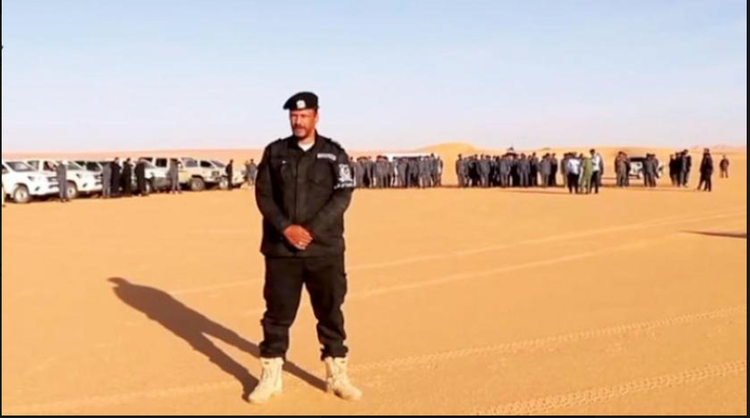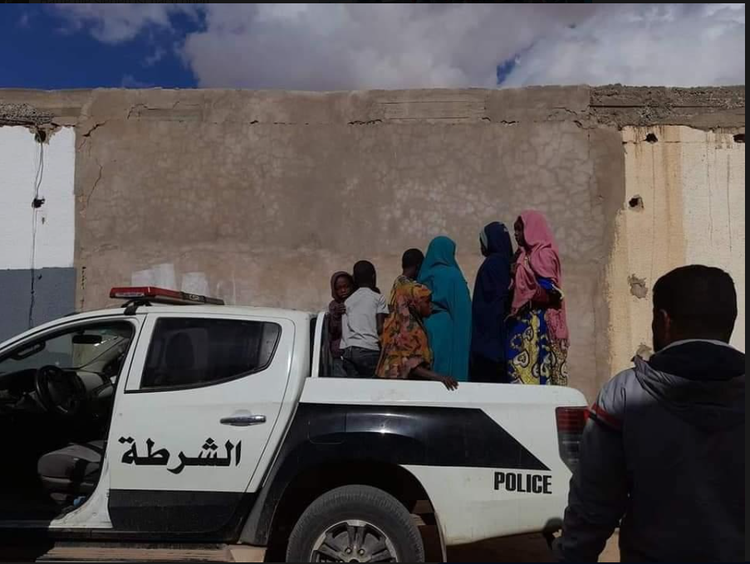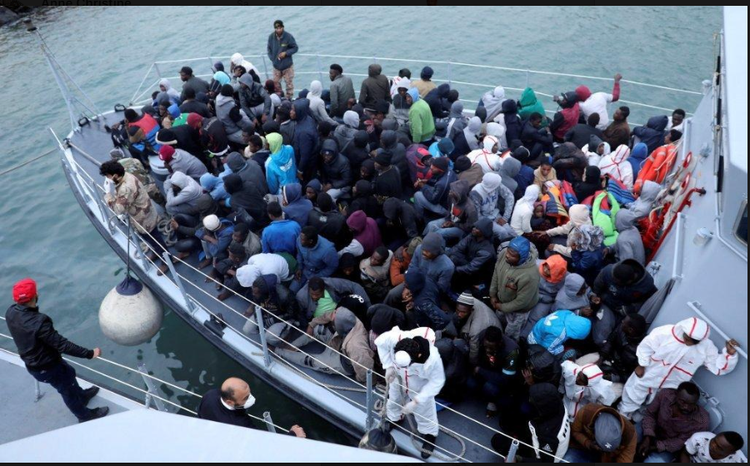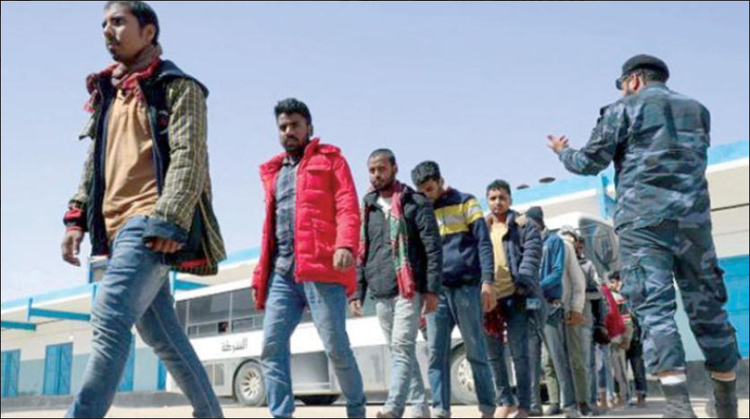The experience of Sudanese migrants in Libya
March 5th, 2023 - written by: Maimoon Sheikh
This article is part of a series of articles on migration movements into, in, and out of Sudan. The compilation is dedicated to the 4th anniversary of the Sudanese Revolution. It is a collaborative effort by SudanUprising Germany and the Migration-Control.Info-project.
With this publication we want to contribute to knowledge about the situation of the precarious populations in Sudan – refugees, displaced people, and marginalized populations in the big cities as well as in “the periphery”- the areas outside the centre of the country and its main towns. We accompany people on the move and shed a light on their experiences and the injustices they face, which are so severely increased by EU migration politics. Most certainly, the mass murdering militias of the Janjaweed would not have grown as they did without European tolerance and support, parallel to the support for the Libyan militias which pretend to be a coast guard.
We will publish the articles in 3 languages at the same time: AR, EN and DE. The next articles to follow, on a weekly basis, are on
- The experiences of women refugees in Sudan,
- Ethiopian Refugees in the Triangle City,
- the experience of Sudanese Immigrants in Libya,
- an overview of migration movements, state politics, and displacement,
- the European support to the Janjaweed,
- two articles on refugee camps,
- refugee resistance in North Africa,
- the situation of Sudanese refugees in Europe.
The experience of Sudanese migrants in Libya
By Maimoon Sheikh
Maimoon is currently working as a researcher with Belaady Foundation for Human Rights in South Libya and is a wrriter for the Twala magazine.
Credits for all fotos to the autor.
Introduction
In the last ten years, Sudan witnessed two important events in its contemporary history, and these events contributed greatly to changing the political, social and geographical features of the country. After 30 years of dictatorial rule by Omar al-Bashir, the "revolution" broke out, in which cheers rose and groups of girls exchanged signs of freedom, encouraging each other. Voices roared together with the words: “Freedom peace and justice!” and with all the demands, which have become familiar, of the pro-democracy demonstrators. Amidst an infectiously rising enthusiasm, these protests led, in late 2018, to a coup, which contributed to the overthrow of Al-Bashir on April 11, 2019. Before this incident, considered very important in the history of Sudan, there was another important one: the secession of South Sudan from the north on July 9, 2011. These incidents resulted in the emergence of many problems and challenges in Sudanese society in general; among those problems was the increase in the number of Sudanese migrants and asylum seekers who decided to leave Sudan for several reasons related to their security, dignity and the search for a safe haven for themselves and their families.
The first destination for Sudanese migrants was the country of Libya, which shares land borders with Sudan. In its report on migrants present in Libya, the International Organization for Migration classified Sudanese migrants among the five largest nationalities present in Libya in 2021, with Niger ranking first, Egypt second, Sudan third, and Chad fourth, while migrants from Nigeria ranked fifth.

Many Sudanese migrants have gone through different experiences in Libya, but most of these experiences have in common the continuous search for security, hope and a decent life away from the conflicts and wars in Libya and the unstable conditions in Sudan. The journey in search of hope for Sudanese migrants begins the moment they enter Libyan territory; more often than not, this is done through the Libyan city of Kufra, a first stop for most Sudanese migrants. The category of migrants in Libya is divided into three main [sub-]categories. The first is that of economic migrants.
"Economic migrants"
Those are people who migrated from one country to another to improve the poor living conditions that they faced in their countries of origin. Usually, "economic migrants" are not eligible for asylum, unless the economic conditions they faced are severe enough to cause public violence or to significantly disrupt public order. There are many those people in Libya; they are heavily involved in the Libyan labor market and work in various Libyan cities. It should be noted here that Sudanese immigrants enjoy notable acceptance by Libyans—more than any other category of migrants. Their assistance is always sought as teachers, accountants, engineers, chefs, or other liberal professions in the Libyan labor market.
One of the Sudanese migrants in the city of Sebha told us about his experience when he decided to emigrate from Sudan to Libya, so that he can secure a job that would help him support his family in Sudan. Before he reached the city of Sebha, Muhammad was detained twice by the Directorate for Combatting Illegal Immigration, but was fortunate to not be deported by the Libyan authorities, as happens to many migrants who are arbitrarily returned to their countries. In 2015, two years after his arrival in the city of Sebha, Muhammad was able to secure a job at a private school as a mathematics teacher, in addition to his work as an accountant at a store in the city. Although Libyan law criminalizes immigration, and Article 3 of Law No. 19 of 2010–on combating illegal immigration–imposes a fine of up to 3,000 dinars on any Libyan citizen who provides a job on Libyan soil for an irregular migrant, the law is not applied in practice, since the Libyan state itself relies heavily on migrants in most of its institutions. For example, most of the workers in the General Company for Cleaning Services are migrants who had entered Libya irregularly. Therefore, most of the articles mentioned in Law No. 19 of 2010 are not applied in real life; this encourages most migrants, including Sudanese migrants, to join the labor market without any fear of legal risks.
Sudanese refugees and asylum seekers
Sudanese refugees and asylum seekers are considered the most vulnerable groups among Sudanese migrants in Libya. This is due to the difficult conditions which posed a threat to their lives and security in Sudan, and which made them consider emigration and submission of an asylum application at the offices of the United Nations High Commissioner for Refugees (UNHCR) in the city of Tripoli. However, migrants who want to submit an application face many difficulties, namely that of reaching the UNHCR. This is because the commission does not have offices in all Libyan cities, only Tripoli. This issue has been criticized by Libyan human rights organizations because it causes much trouble for migrants who reside outside Tripoli while trying to reach the UNHCR. Due to the large number of security points along the roads that lead to the city, most of the asylum seekers attempting to reach it to submit their asylum applications are arrested.

Kamal is a Sudanese migrant who entered Libya by land. The first station he reached was the city of Kufra, which is the closest to the Sudanese-Libyan border, as well as the first destination for Sudanese and other migrants of various nationalities, such as Eritreans and Ethiopians. Kamal, a Sudanese refugee from South Sudan, decided to migrate to Libya because of the wars and conflicts his country is going through. His goal after entering Libya was to reach Tripoli to submit an asylum request with the UNHCR, but the challenge was too great since he would have to travel more than 1,700 kilometers to arrive there. This is a great challenge for all migrants because they do not have any documents indicating entry into Libya in a regular manner, and Libyan law criminalizes immigration and considers it an illegal act. This gives the Directorate for Combatting Illegal Immigration the powers to arrest migrants and to transfer them to the Directorate’s detention centers, where they are subjected to many violations such as beatings, malnutrition, degrading treatment, and forced return to the countries from which they fled for fear of persecution.
After several days, moving from one smuggler to another, Kamal was able to reach Tripoli, but was arrested there by the immigration authority and transferred to a center affiliated with the illegal immigration authority in Tajoura. After more than six months, Kamal was able to escape from the detention center and to get help from the Sudanese migrants in Tripoli, so he submitted an asylum request to the UNHCR. However, he is afraid of being arrested again and returned to the detention center, since neither the Ministry of Interior nor the forces affiliated with the Libyan military recognize the documents issued by the UNHCR to refugees and asylum seekers in Libya. Thus, the security forces and armed groups always arrest these persons at random, even if they carry documents indicating that they are refugees or asylum seekers.
The various groups of migrants in Libya attempt to work together as groups to provide support and assistance to one another. Among the most organized groups in this aspect are the Sudanese migrants. The Sudanese community in Libya provides help to various Sudanese and other migrants; assistance may consist of providing financial aid to a migrant or a family in need of medical treatment, shelter, or to submit an asylum application. Sudanese migrants have led several vigils in front of the UNHCR headquarters to demand their rights and evacuation from Libya. Sudanese and migrants of various nationalities led a protest in 2019 calling on the United Nations to open an investigation into the bombing of an migrant detention center in Tajoura, which contained about 600 irregular migrants of various nationalities, most of whom were attacked by the Libyan Coast Guard on their way to Europe. Many migrants resort to emigrating to Europe by sea to escape the hell of detention in Libya, and most of the time they are unable to reach Europe either because they are turned back by the Libyan Coast Guard or because their boat sinks.

Refugee Abuses
In June 2022, the Sudanese website published news of a boat’s sinking off Libya’s coast, which carried 70 irregular migrants, including 60 Sudanese, on their way to Europe. According to the head of the Program for the Reduction of Irregular Migration and Voluntary Return of Sudanese Communities in Libya, the reason for the sinking of the boat is that it came under fire from armed groups, which he described as pirates, and the aim of shooting at it was to seize the boat's engine. It should be noted that according to a report issued by the International Organization for Migration, 14,157 migrants have been intercepted and returned to Libya since the beginning of 2022. The organization said that at least 216 people died while trying to cross over, while 724 people are still missing and likely to have perished.
One of the most common practices through which migrants are subjected to abuse is interception by the Libyan Coast Guard and return to Libya. This was criticized by many Libyan organizations because migrants, when they are arrested by the Coast Guard, are subjected to many violations, which begin at the disembarkation points of the Guard. There, in many cases, minors are separated from their families, and then migrants are transferred to detention centers where the bare minimum of life’s necessities is not available. Migrants are also subjected to other violations, represented in being forcibly deported either across the land borders through Sudan and Niger, or deported by the Directorate for Combatting Illegal Immigration via airport to their countries.

Belaady Foundation for Human Rights in Libya has repelled several arbitrary deportations of Sudanese and other migrants, such as Eritreans and Ethiopians, across the desert between the Libyan-Sudanese borders. The Directorate for Combating Illegal Immigration - Kufra Branch announced on November 11, 2022, on its official Facebook page, the deportation of 43 Sudanese migrants by land across the desert without prior coordination between it and the Sudanese army, a behavior that endangers the lives of migrants. All deportations carried out by the immigration apparatus in Libya are illegal and are always made under the pretext that migrants are infected with certain diseases such as AIDS, hepatitis, or other issues, although this is not considered a convincing reason for deportation. Major General Tariq bin Ziyad also announced on more than one occasion the deportation of migrants of various nationalities across the Libyan-Nigerien borders, where refugees and migrants living in official detention centers are stuck in a cycle of abuse and extortion—held in inhuman and sometimes deadly conditions. Migrants may be separated from their families, and victims recount being subjected to torture and other ill-treatment, sexual violence, and labor exploitation. Some migrants and refugees are also held in detention facilities run by armed groups and human traffickers. Those who are not detained are forced to live in hiding, where they are vulnerable to many abuses, including physical assaults, abduction, theft, sexual violence, human trafficking, forced labor, and forced deportation.
The UN considers the forcible deportation of Sudanese migrants by the Libyan authorities a violation of international refugee rights law. In addition, the Office of the UN High Commissioner for Human Rights condemned the way with which the Libyan authorities dealt with the immigration file, and considered it a violation of the international conventions to which Libya is a party. It is worth noting that Libya is not a party to the International Convention on Refugees of 1951. But it is party to other agreements that are based on the same principles and which provide for the protection of migrants and asylum seekers, such as the African Unity Convention for Refugees, which is ratified by Libya. As such, Libya is obligated to protect migrants and refugees and provide them with a safe environment in the country.
Please find an interview with a spokjesman of Belaady here.